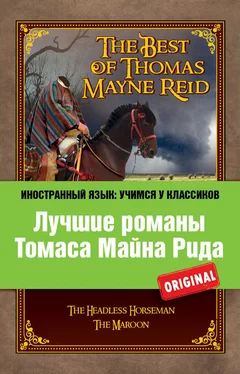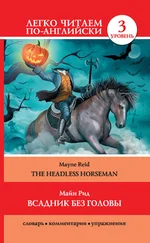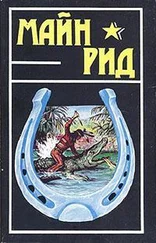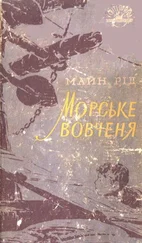Had the unlucky sportsman been at all doubtful of the fact of his having killed the bird, he would have given up the search in despair. But upon this point he was as certain as of his own existence; and it was that which rendered him so pertinacious in his endeavours to find it. He was determined to leave neither stick nor stone unturned; and, to aid him in the prosecution of his search, he called loudly for his retriever Quashie.
But to his repeated calls no Quashie came; and Mr Smythje was forced to the conclusion that the darkey had either gone to sleep, or had strayed away from the spot where he had left him.
He had some thoughts of going back to look for Quashie; but, while he was meditating on the matter, an idea occurred to him, which promised to explain the mysterious disappearance of the bird.
The stump upon which the “turkey” had been perched could scarcely have been termed a stump . It was rather the trunk of a large tree, that had been abruptly broken off below the limbs, and still stood some fifteen or twenty feet in height, erect and massive as the tower of some ruined castle. Though quite a dead-wood, and without any branches of its own, it was, nevertheless, garnished with verdure. A complete matting of vines that grew around its roots, and parasites that sprang from its decaying sides, inclosed it with a tortuous trellis-work – so that only near its top could the shape of the old tree be distinguished.
At first the sportsman supposed that his game had dropped down among the ragged shrubbery; and he searched the whole of this with elaborate minuteness, but in vain.
It now occurred to him – and this was the idea that promised the éclaircissement spoken of – that the bird had not fallen from the stump, but had dropped dead upon the top of it, and there might still be lying!
The dead-wood, which, at its broken summit, appeared to be some five or six feet in diameter, rendered this conjecture probable enough; and Smythje resolved upon putting it to the proof, by climbing to the top. He would have appointed Quashie to the performance of this feat; but Quashie non esset inventus [517] .
Several thick, cable-like vines, that struggled up to the summit, promised an easy means of ascent; and, although the Cockney could climb about as dexterously as a shod cat, he fancied there could be no great difficulty in attaining the top of the dead-wood.
Throwing aside his gun, he entered enthusiastically upon the attempt.
The feat was not so easy of performance but that it cost him an exertion. Stimulated, however, by the desire to retrieve his game and the reflections about the game-bag, already alluded to, he put forth his utmost energies, and succeeded in reaching the summit.
His conjecture proved correct. There lay the bird – not on the stump, but in it – at the bottom of a large cylinder-shaped concavity, which opened several feet down into the heart of the dead-wood. There it was, dead as the tree itself.
The sportsman could not restrain himself from uttering a cry of joy – as he saw his fine game at length secure within his reach.
It proved not exactly within his reach, however: as, upon kneeling down and stretching his arm to its full length, he found that he could not touch the bird, even with the tips of his fingers.
That signified little. It would only be necessary for him to descend into the cavity, and this he could easily do: as it was wide enough, and not over four feet in depth.
Without further reflection, he rose to his feet again and leaped down into the hole.
It would have been a wiser act if he had remembered the prudent counsel of the paternal frog, and looked before leaping. That was one of the most unfortunate leaps Mr Smythje had ever made in his life. The brown surface upon which the bird lay, and which looked so deceptively solid, was nothing more than a mass of rotten heartwood, honeycombed with long decay. So flimsy was it in structure, that though supporting a dead bird, it gave way under the weight of a living man; and the lord of Montagu Castle shot as rapidly out of sight as if he had leaped feet foremost from the mainyard of the Sea Nymph into the deepest soundings of the Atlantic!
Chapter 4
Smythje Embarrassed by his Boots
Rapid as was the pitch, and dark the abyss into which it was made, the sportsman was not killed. Neither was he much hurt: for the “punk” through which he had pitched, though not firm enough to support him, had offered some resistance to the velocity of his descent; and towards the bottom he had settled down more gradually.
But though neither killed nor yet stunned by the fall, he was for awhile as completely deprived of his senses as if he had been both. Surprise had bereft him not only of the power of speech, but of thought as well; and for some moments he was as quiet as Jack, after being jerked into his box.
After a time, however, feeling that, though badly scared, he was not much hurt, his consciousness began to return to him; and he made a scramble to recover his legs: for in going down, he had somehow got doubled up in a sort of tailor-fashion.
He found his feet after an effort; and, as he saw that light came from above, he raised his eyes in that direction.
It took him some time to make out the exact character of the place in which he was: for a thick “stoor” was swimming around him, that not only impeded his sight, but having entered his mouth and nostrils, had inducted him into a violent fit of sneezing.
The dust however gradually thinned away; and Smythje was enabled to “define his position.”
Above his head was a clear circular patch, which he knew to be the sky; whilst all around him was a dark brown wall, rising many feet beyond the reach of his outstretched arms. He became conscious that he was standing in the concavity of a huge upright cylinder, with a surface of corrugated rotten wood circling all around him.
As his senses grew clearer – along with the atmosphere – he arrived at a better understanding of the mishap that had befallen him. He did not, at first, regard it in the light of a misfortune – at least, not a very heavy one – and he was rather disposed to laugh at it as a ludicrous adventure.
It was not till he began to think of climbing out, and had actually made the attempt, that he became aware of a difficulty hitherto unsuspected; and the contemplation of which at once inspired him with a feeling of alarm.
A second attempt to get out was unsuccessful as the first; a third equally so; a fourth had no better issue; a fifth was alike a failure; and after the sixth, he sank down upon the rotten rubbish in a state bordering on despair.
Well might he have exclaimed,
“ Facilis descensus Averni, sed revocare gradum [518] .”
But the mind of Mr Smythje was now under the influence of an indescribable awe, which excluded all thoughts of the classic.
When reflection came to his aid, it was only to make more certain the fearful reality of his situation. The more he reflected upon it, the more he became convinced of the peril into which his rash leap had precipitated him.
It was not simply a slight mishap – a ludicrous adventure – he no longer saw it in that light. Neither was it a mere misfortune; but a positive danger – the danger of his life.
Yes, his life was most certainly in danger; and he was not slow in arriving at this knowledge. The chain of inductive reasoning that led to it was but too palpably clear – every link of it – from premisses to conclusion. If he could not help himself out of the prison, in which by his unlucky leap he had incarcerated himself, who was to help him?
Hope could not long dwell upon Quashie. The darkey had been left some distance off; and since he had not answered to his calls, he must be asleep or straying. In either case – or even if awake and still on the ground of the bivouac – what chances would Quashie have of finding him?
Читать дальше
Конец ознакомительного отрывка
Купить книгу











